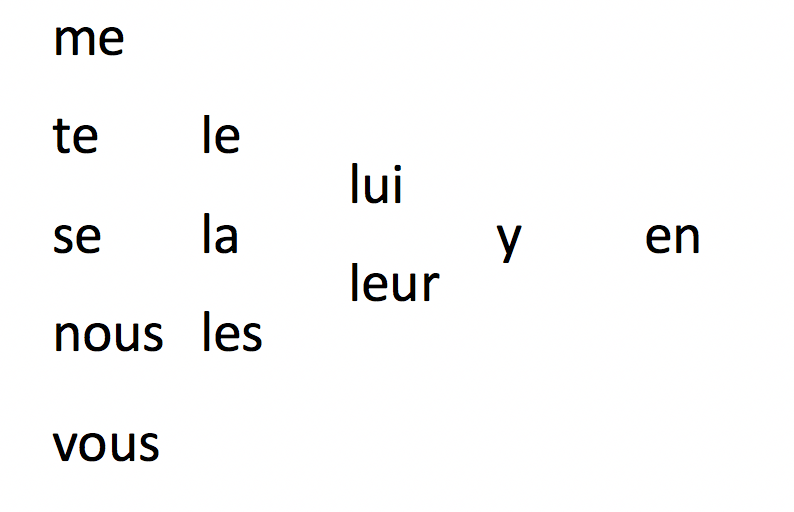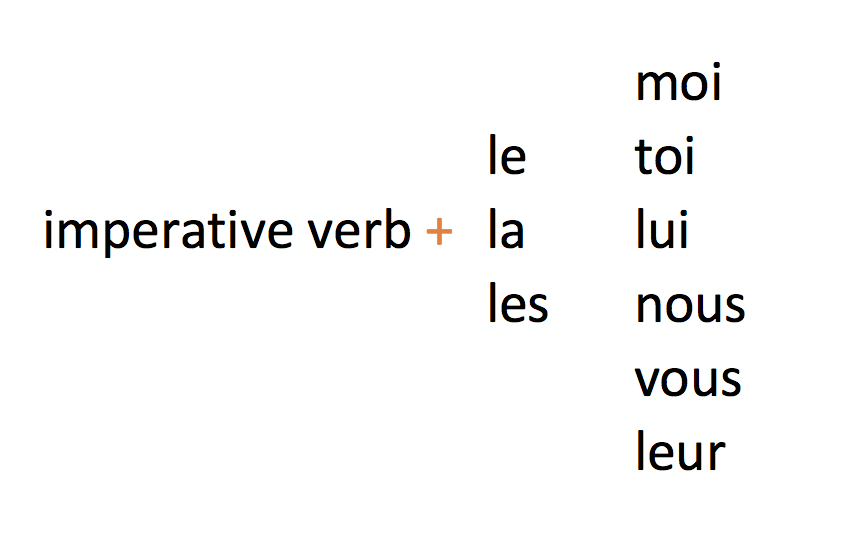


Here object pronouns come directly before the verb (or in a compound tense , the auxiliary verb avoir or être). In cases where there are two pronouns the order is as follows:

Elle me les a rendus
She gave them back to me
Ils nous en prêteront
They will lend us a few
Je ne la lui ai pas envoyée
I didn't send it to him / her
Il y en a encore
There are more of them
This rule also applies for all questions, including those formed by inversion:
Me les a-t-elle rendus?
Did she give them back to me?
Nous en prêteront-ils?
Will they lend us a few?
Ne la lui ai-je pas envoyée?
Didn't I send it to him / her?
Y en a-t-il encore?
Are there any more of them?
When a verb is used with an infinitive , the object pronouns tend to come directly before the infinitive:
Je compte la leur présenter
I’m planning on introducing her to them
Sometimes, however, the verbs are so closely tied together that object pronouns are placed before the first verb. This is the case with faire, laisser or verbs of perception such as voir, entendre etc. + an infinitive verb:
Il a fait rire les enfants → Il les a fait rire
He made the children laugh - He made them laugh
Je n’ai jamais entendu parler de ce livre → Je n’en ai jamais entendu parler
I have never heard of that book - I have never heard of it
In the affirmative imperative , however, object pronouns come after the verb and are linked to it by a hyphen:
Tu veux du chocolat? Prends-en!
Do you want some chocolate? Take some!
Ce sera bientôt l’anniversaire de ta mère. Envoie-lui une carte!
It will soon be your mother’s birthday. Send her a card!
Note that in this case moi and toi are used instead of me and te (e.g. écoute-moi and assieds-toi). Moi and toi then align with lui and leur in terms of word order (tu peux me le passer, but passe-le-moi). The word order thus becomes:

Tu as trouvé ses clefs? Donne-les-lui!
Did you find his keys? Give them to him!
Tu as des photos? Montre-les-moi!
Do you have some photos? Show them to me!
Y and en as before come after the object pronouns above, but note that before en, moi reverts to m' and toi to t':
Tu a du chocolat? - Donne-m'en!
Do you have some chocolate? Give me some!
Ils aiment la glace? - Achète-leur-en!
Do they like ice-cream? Buy them some!
Note also that in the second person , the verb aller and verbs ending in -e take an -s before the object pronouns y and en: vas-y!, achètes-en! This is for reasons of sound.
In the negative imperative , however, object pronouns come before the verb :
Ne les lui donne pas! Ne me les montre pas!
Don’t give them to him! Don’t show them to me!
Ne m’en donne pas! Ne leur en achète pas!
Don’t give me any! Don’t buy them any!
When the object pronoun le is used to refer to parts of a sentence other than a noun , it is said to be a neutral pronoun. In this case it is often not translated by the equivalent neutral pronoun in English, it. The neutral pronoun le can refer to:
Autrefois Pierre était très timide, mais il ne l'est plus
Pierre used to be very shy, but he isn’t any longer
Cet étudiant est plus doué que je ne l'ai d'abord cru
This student is more gifted than I first thought
Elle vient d’être sélectionnée pour un prix: elle ne l’a jamais été auparavant
She has just been nominated for a prize: she never has been before
Je peux garder les enfants. Dites-moi si vous le voulez avant le week-end
I can look after the children. Tell me if you want me to before the week-end
The object pronoun le is often used to anticipate a fact, idea, statement etc. when in English a pronoun is not normally used:
Comme vous le savez déjà
As you already know
Comme je vous l'ai déjà dit
As I have already told you
By contrast, sometimes the object pronoun le is not so used where the equivalent construction in English does use the pronoun it:
Je trouve difficile de m’installer ici
I find it hard to settle down here
Verb constructions acting like this include trouver, juger and estimer + adjective + que.
These are : moi, toi, lui, elle, nous, vous, eux, elles, soi. They are used:
After all prepositions (except à and de) and the conjunction comme, to replace nouns referring to both people and things:
Pour un ancien soldat comme lui, ce n’est pas un problème
For a former soldier like him, it's not a problem
Ma carte de crédit ? Je ne sors jamais sans elle!
My credit card ? I never leave home without it!
As outlined in Unit 29, nouns introduced by à are replaced by an indirect object pronoun if they refer to people, and by y if they refer to things. Note, however, that the disjunctive pronoun is used to replace nouns referring to people in two cases. After pronominal verbs taking the preposition à:
Il a du mal à s’habituer à ses nouveaux collègues → Il a du mal à s’habituer à eux
He's having problems getting used to his new colleagues / to them
After certain verb constructions such as penser à, songer à, rêver à, être à, faire attention à, avoir affaire à, tenir à, faire appel à:
Elle pense beaucoup à son frère → Elle pense beaucoup à lui
She thinks of her brother / of him a lot
Here the disjunctive pronoun is used to replace nouns referring to people:
Est-ce que tu te souviens de lui?
Do you remember him?
When a pronoun is emphasized or contrasted (see also Unit 56):
Moi, je n'en sais rien
I don't know anything
Non, c'est ton avis à toi
No, that's your opinion
Il ne fait rien, lui
He doesn't do anything
Vous êtes à un bout de la maison, eux à l'autre
You’re at one end of the house, they’re at the other
When an pronoun is separated from the verb by another word or expression:
Moi aussi, je les ai vus
I saw them as well
Lui seul le savait
He alone knew
When a pronoun is the only word in a sentence:
Qui a parlé ? - Moi
Who spoke ? Me
When a pronoun is used with et, où or ni:
Pierre et moi avons décidé d’acheter une nouvelle voiture
Pierre and I have decided to buy a new car
When a pronoun stands as the antecedent of a relative clause :
Lui qui était normallement si courageux
He who was usually so courageous
When a pronoun is used after il y a, c'est or another complement of être:
Il n’y a que moi dans la salle
There’s only me in the room
C'est moi
It’s me
Ce n’est pas eux qu’il cherche
It’s not them he’s looking for
Je ne suis pas toi
I am not you
When a pronoun is an indirect object pronoun used after an imperative (see section 1.3 above).